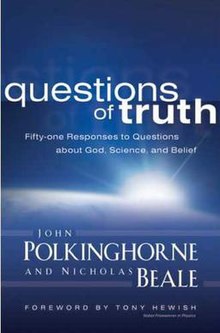Nicholas Beale
 |
|
| Author |
Polkinghorne, John Beale, Nicholas |
|---|---|
| Country | United States |
| Language | English |
| Subject | Science and Religion, Theology |
| Genre | Non-fiction |
| Publisher | Westminster John Knox |
|
Publication date
|
2009 |
| Media type | |
| ISBN | |
| OCLC | 229467436 |
| 215 pp. | |
| LC Class | BT77 .P65 |
Questions of Truth is a book by John Polkinghorne and Nicholas Beale which offers their responses to 51 questions about science and religion. The foreword is contributed by Antony Hewish.
The book was launched at a workshop at the 2009 American Association for the Advancement of Science Annual Meeting in Chicago, and then in the UK at a discussion at the Royal Society chaired by Onora O'Neill, in a week when it was also featured on the Today Programme.
The book grew out of questions generated at a website organized to communicate Polkinghorne's ideas. It groups selected questions under seven topics:
Each question is followed by the responses of Beale and Polkinghorne, sometimes as a single answer and sometimes by the two authors individually. Its three appendixes constitute a third of the book:
Julian Baggini, writing in the Financial Times, said that Polkinghorne has no problems reconciling his faith with his science and suggests that "despite the complexity of some of the scientific issues discussed", the book "is a commendably clear read". He says "it is a pity that the people most likely to buy this book are those simply seeking intellectual reassurance that their faith is not irrational. Those who would most benefit from reading it are in fact fundamentalists who think that evolutionary science must be wrong, and overconfident atheists who believe that the religious are manifestly irrational.”
A. C. Grayling wrote a highly critical review in the New Humanist. He states that the responses to questions concerning science and religion boil down to three strategies, God of the gaps, inference to the best explanation, and religion and science explain truths in different domains. He considers the first two refutable by undergraduates, and for the third strategy to work, he contends that one has to "cherry-pick which bits of scripture and dogma are to be taken as symbolic and which as literally true" in order to conveniently avoid the possibility of direct and testable confrontation with science. He concludes the review by expressing his outrage at the Royal Society's decision to allow its premises to be used for the launch of the book, as in his opinion this amounts to having "the superstitious lucubrations of illiterate goatherds living several thousand years ago given the same credibility as contemporary scientific research."
...
Wikipedia
